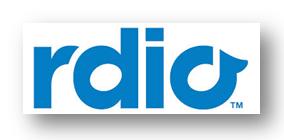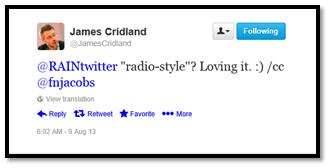There it was on RAIN last week (pointed out snarkily by consultant James Cridland on Twitter, I should add) in an article about a new Rdio feature called “Stations” which is all about creating “radio-style listening” on a pure-play platform.
Rdio is yet another company hacking away at trying to create a new and different version of radio in the streaming space.
And in fact, a look at other pure-plays reveals the same use of traditional radio language to describe their products – stations, formats, playlists. These services may be new, trying to create a unique niche in the Internet space, but they’re all trying to create the radio experience. Is it any wonder that most of their programming and sales hires are also former radio broadcasting pros, who are working hard to create a better version of products they’ve been connected with their entire careers?
 It’s a similar situation when you focus on “connected car” technologies, whether it’s the kinds that automotive companies are creating (Uconnect, Entune, CUE, etc.) or brands like Panasonic, Pioneer, and other Tier 1’s rushing to create technologies and aftermarket products. They are all designed to mimic radio technology, its appearance, and the customer experience. It’s why the knobs are returning on many new vehicle “center stacks.” Consumers are most comfortable with the simple, clean radio interface they’ve used since they first sat in the passenger seat when they were adolescents.
It’s a similar situation when you focus on “connected car” technologies, whether it’s the kinds that automotive companies are creating (Uconnect, Entune, CUE, etc.) or brands like Panasonic, Pioneer, and other Tier 1’s rushing to create technologies and aftermarket products. They are all designed to mimic radio technology, its appearance, and the customer experience. It’s why the knobs are returning on many new vehicle “center stacks.” Consumers are most comfortable with the simple, clean radio interface they’ve used since they first sat in the passenger seat when they were adolescents.
All of these companies – hardware and software – are in a race to try to improve the radio experience – coming up with ostensibly better ways to make audio more entertaining, personal, and compelling to consumers.
So, two suggestions:
For consumers: If you’re looking for a true “radio-style” experience, try listening to the radio. It is the real deal, with DJs, commercials, and true curation – you never know exactly what’s coming next.
And for radio companies: All this activity should tell us – once again – that many companies, much funding, and armies of smart people are working hard to try and create a better version of what you do every day. Who better than traditional radio companies to play quarterback? The radio broadcasting industry should be leading that charge to innovate a better, more customized, engaging experience.
Radio has historically lacked a CX focus – for decades. It has been about making radio that gets ratings and revenue. No problem with those goals, but now it’s the consumer’s turn at the controls. Radio would do well to turn its energies, resources, and people toward bettering an already amazing product that has stood the test of time and continues to be central to most audio entertainment menus, as well as consumers’ lives.
The competition is coming at radio with guns ablazing. It’s time to go back to the Marketing 101 playbook and start acting like there’s a war going on. No group is better suited to create a better “radio-style” experience than radio people.
- What To Do If Your Radio Station Goes Through A Midlife Crisis - April 25, 2025
- A 2020 Lesson?It Could All Be Gone In A Flash - April 24, 2025
- How AI Can Give Radio Personalities More…PERSONALITY - April 23, 2025





…and, may I add… don’t try to “out-music” the music machines. They have a better jukebox than you. Radio’s magic is between the songs. Start there and win.
Good point, Johnny. Thanks for chiming in and reading our blog.
Well. Actually radio is the most least group able to create a better radio-style experience. They have no knowledge about algorithms and software. They never had to personalize (content or advertisement) and they never built the devices. So I think radio is going the same way as the music industry did and the newspapers still do. Falling apart before somebody else comes and saves them.
Robert, I appreciate the opinion but there are stations that “get it” and the post challenged others to step it up. If everyone is mimicking radio, isn’t it seems logical the structure and capabilities exist to provide a better experience? Thanks for the opinion.
Hey Fred. Thanks for your answer. I truly believe that radio will be there forever. Some guy talking about stuff and maybe playing some music. At the end you will have a bunch of services on your device where you used to listen to radio. And I do not just mean music streaming. Games, videos, videocalling, livestreams of football matches. The question is which brand will provide audio information and entertainment and I just don’t see enough radio stations stepping up and innovate. If as a company you stay with some classic radio format you won’t get far. I think you completely have to rethink where and when people listen and what they demand. And then you have to take a step back and try to deliver. Always in mind that apple and google own most of the devices audio is going to be listened through in the near future.
Good points, Robert, and I think we’re saying pretty much the same thing. Structurally and simplicity-wise, radio has a big leg up. People are used to listening, but the industry needs to rethinks the givens and look for ways to make it better for fans. Thanks again for continuing the conversation.
What about the cx the has radio improved in the past 10 years? I don’t mean anecdotally, I mean as an industry.
Sent from my smartphone playing a red dirt/alt country station on a pure play.
Radio has a long way to go in the CX department. It might start with being responsive to listeners over the phone, at events, and socially. Again, some stations “get it,” but many others still perceive it’s top down. Thanks for the comment, Bob.
Aren’t we far enough down this road for hindsight to be useful in hinting at where radio should be headed? It’s 20/20, you know…
This is not the first time we’ve made some of the points in this post. It’s been an ongoing conversation about stepping up efforts to improve the experience, and improve on past successes, history, and habit. The radio industry needs to take a broader view of the competitive challenges. Thanks for the comment, Keith.